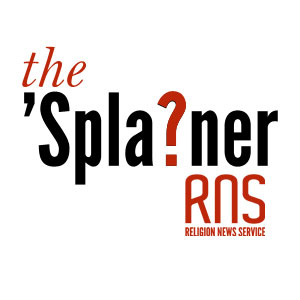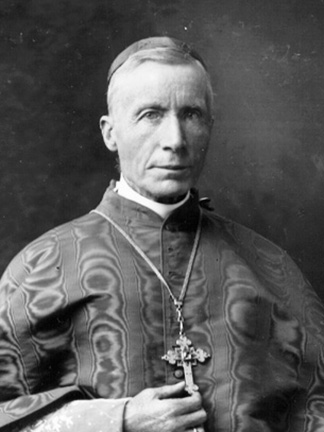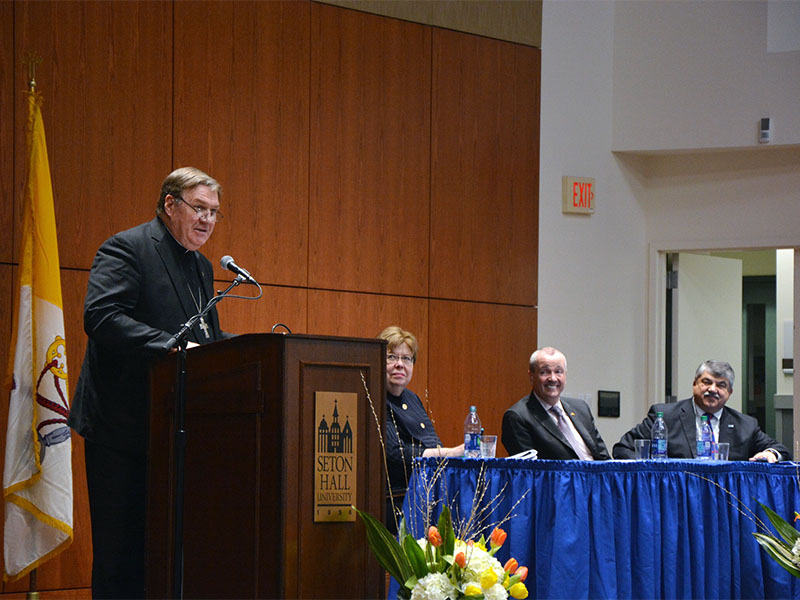 The ’Splainer (as in “You’ve got some ’splaining to do”) is an occasional feature in which the RNS staff gives you everything you need to know about current events to hold your own at the water cooler.
The ’Splainer (as in “You’ve got some ’splaining to do”) is an occasional feature in which the RNS staff gives you everything you need to know about current events to hold your own at the water cooler.
(RNS) — The U.S. Conference of Catholic Bishops in January sided with unions in a case before the Supreme Court, submitting an amicus brief in support of public-sector unions and their right to collect money from nonmembers for collective bargaining.
The bishops’ involvement with Janus v. American Federation of State, County and Municipal Employees surprised some. But church leaders have since doubled down, taking part in a forum last week on labor and faith at Seton Hall University. Newark Cardinal Joseph Tobin, on stage with AFL-CIO President Richard Trumka, explained the bishops’ interest in the case and reiterated the church’s enthusiastic support for unions.
“You should not be able to join a union shop and then turn it upside, any more than you should be able to join a church and then insist we stop meeting on Sunday mornings and instead gather for worship on Mondays during Monday night football,” he said. “And you should not be able to benefit from all the work that unions do to represent workers without paying your fair share.”
So where does this affinity between Catholic bishops and labor movements come from? Let us ’Splain …
How far back does Catholic support for labor unions go?
One of the earliest expressions of solidarity between the Catholic Church and modern labor movements came in 1887, when Cardinal James Gibbons of Baltimore defended a secretive pro-labor society known as the Knights of Labor in a letter to the Vatican. Church leaders had condemned various secret societies at the time, but Gibbons argued that the Knights — who claimed a number of Catholic members — were not an enemy of Catholicism and that church leaders should stand with working people. It worked: Gibbons persuaded his superiors not to condemn the American group.
Did that support for unions go all the way to the top?

Cardinal James Gibbons worked for union rights during his tenure as archbishop of Baltimore. Photo courtesy of Creative Commons
The Knights declined as an organization soon after, but Gibbons’ arguments had an impact on Pope Leo XIII, who incorporated many of them in his 1891 encyclical “Rerum Novarum.” Leo railed against unrestricted capitalism and lifted up unions as an important form of “private society,” cementing the burgeoning spiritual alliance between labor groups and the church.
“The most important of all (private societies) are workingmen’s unions, for these virtually include all the rest,” he wrote.
The encyclical, which Tobin described as “the Magna Carta of Catholic social doctrine,” became a rallying cry throughout the 20th century for various unionizing campaigns and labor rallies.
OK, so there’s a pro-labor encyclical. What else has the church done to support unions?
The church remained involved in the lives of workers and sometimes even took on their plight: In the 1940s, some clerics in France became “worker-priests,” joining everyday workers on factory assembly lines. (Side note: This turned out to be a dicey move, as the pope later cracked down when the priests became involved in politics.)
Meanwhile, church leaders continued to voice support for unions. In his 1981 encyclical “Laborem Exercens,” St. John Paul II lauded organized labor organizations as “an indispensable element of social life” (although he cautioned they should not “play politics” or associate themselves too closely with political parties). Pope Benedict XVI also acknowledged the lengthy history of Catholic-labor relations in his own 2009 encyclical, “Caritas in Veritate.”
“The repeated calls issued within the Church’s social doctrine, beginning with Rerum Novarum, for the promotion of workers’ associations that can defend their rights must therefore be honoured today even more than in the past, as a prompt and far-sighted response to the urgent need for new forms of cooperation at the international level, as well as the local level,” he wrote.
Finally, Pope Francis carried on this tradition, telling a gathering of union delegates in 2017, “There is no good society without a good union.”
Why do the bishops care so much about the Janus case?
The precise issue in the case hasn’t been addressed by a full assembly of the bishops. But their brief argues that ruling against the unions would “constitutionalize” a “‘right-to-work’ position” — the phrase used to describe state-level laws that prohibit the practice of requiring all who benefit from a union contract to pay dues that fund their union representation. The brief points out that not only has no U.S. bishop ever publicly supported right-to-work laws, but that the group has also been “generally been very inimical” to the idea, and that some individual bishops or state conferences have even spoken out against them.
To wit, they note bishops opposed the Taft-Hartley Act of 1947 — the law that created right-to-work laws — and have supported its repeal.
To show their seriousness of purpose, the bishops’ brief goes on to argue that ruling against the unions would “represent another unfortunate decision of this Court that marginalizes the voice of the bishops.” They point to Roe v. Wade, the landmark decision that legalized abortion, and Obergefell v. Hodges, the ruling that legalized same-sex marriage, as other examples of “marginalizing” Catholic voices (the bishops opposed the high court decision in both cases).
What about Catholics who don’t like the bishops’ stance on labor?
They can be as vocal as the bishops on the issue, and on the Janus case in particular. Bishop Thomas John Paprocki of the Diocese of Springfield, Ill., issued a statement critical of the bishop’s amicus brief in the case, writing, “While church teaching clearly supports freedom of association and the right to form and join a union, it does not mandate coercing people to join a union or pay dues against their will.”
While Paprocki went on to suggest his own neutrality on the subject, writer Ed Whelan, who is also Catholic, rejected the brief’s argument in a piece in the National Review. He did not deny the history of solidarity between Catholics and labor unions but questioned “how these principles apply to whether public-sector unions today should be able to extract agency fees from objecting nonmembers.”
Still, Whelan’s skepticism does not appear to be the prevailing viewpoint among Catholic leaders in the United States.
When Tobin was asked about this kind of pushback in a March 6 news conference, he looked flummoxed. After sharing a bewildered glance with Trumka, the AFL-CIO president, the cleric said: “I would want to talk to them, personally: I would want to say, ‘Tell me how you got there. How (do) you think the values of solidarity, of the nature of economic goods, and innate human dignity — do you think those have changed?’”





